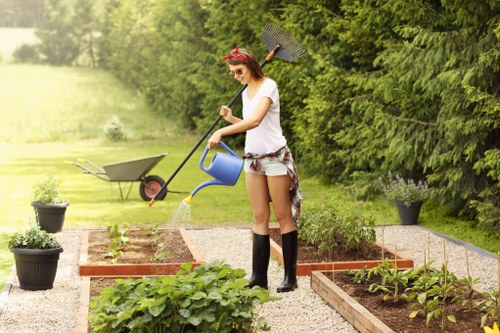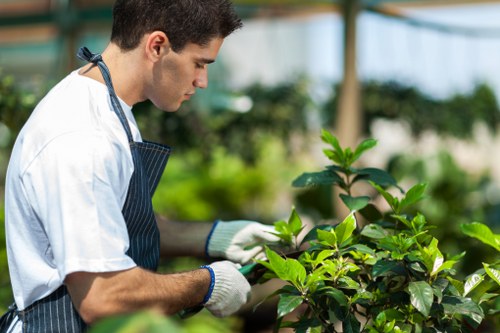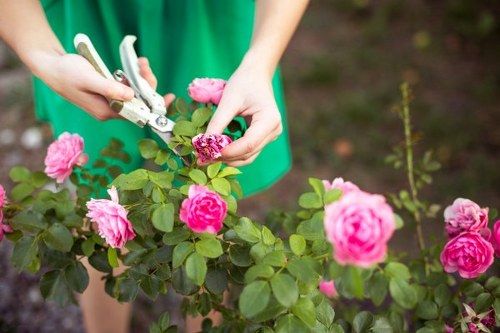Comprehensive Guide to Garden Fencing in Wormwood Scrubs

When it comes to garden fencing in Wormwood Scrubs, homeowners have a variety of options to enhance their outdoor spaces. A well-chosen fence not only provides privacy and security but also adds aesthetic value to your garden.
Wormwood Scrubs offers a unique landscape that requires fencing solutions tailored to its specific environment. Whether you're looking to create a serene garden retreat or secure your property, understanding the different types of fencing available is essential.
In this guide, we'll explore the best fencing options for Wormwood Scrubs, including materials, styles, and installation tips to help you make an informed decision.
Types of Garden Fencing

Choosing the right type of garden fencing depends on your specific needs and the aesthetic you want to achieve. Here are the most popular options:
Wooden Fencing
Wooden fences are a classic choice, offering a natural and timeless look. They can be painted or stained to match your garden's theme and provide excellent privacy.
Pros:
- Customizable design and color
- Provides good privacy
- Natural appearance
Cons:
- Requires regular maintenance
- Can be affected by weather conditions
Wooden fencing is ideal for those who prioritize a traditional look and don’t mind the upkeep.
Metal Fencing

Metal fences, such as steel or aluminum, are known for their durability and low maintenance. They offer a sleek, modern appearance and can be designed to be both functional and decorative.
Types of Metal Fences
There are various styles within metal fencing, including:
- Wrought Iron – Sturdy and ornate, perfect for a classic look.
- Aluminum – Lightweight and resistant to rust, ideal for contemporary gardens.
- Steel – Extremely durable and secure, suitable for high-security needs.
Advantages:
- Long-lasting and strong
- Minimal maintenance
- Variety of styles available
Metal fencing is a great choice for those seeking longevity and a stylish appearance without the hassle of frequent upkeep.
Composite Fencing

Composite fencing combines the best features of wood and plastic. It is made from recycled materials, making it an eco-friendly option that mimics the appearance of natural wood without the associated maintenance.
Benefits of Composite Fencing
- Eco-friendly and sustainable
- Resistant to rot, pests, and weather damage
- Low maintenance compared to traditional wood fencing
Composite fencing is perfect for environmentally conscious homeowners who want a durable and attractive fence.
Installation Tips

Proper installation is crucial for the longevity and effectiveness of your garden fence. Here are some essential tips:
Planning and Measuring
Before installation, accurately measure the area where the fence will be placed. Consider the height, length, and any local regulations or permits required in Wormwood Scrubs.
Choosing Materials
Select materials that suit your climate and garden aesthetic. For example, wooden fences may require more maintenance in humid environments.
Professional Installation vs. DIY
- Professional Installation: Ensures precision and durability, ideal for complex designs.
- DIY Installation: Cost-effective and customizable but requires time and effort.
Assess your skill level and the complexity of your chosen fence before deciding between professional installation and a DIY approach.
Maintenance and Care
Maintaining your garden fence extends its lifespan and keeps it looking great. Here are some maintenance tips:
Regular Cleaning
Clean your fence periodically to remove dirt, grime, and mildew. Use appropriate cleaning agents based on the material of your fence.
Inspect for Damage
Regularly check for signs of damage, such as cracks, rust, or rot, and address any issues promptly to prevent further deterioration.
Protective Treatments
- Apply sealants or paint to wooden fences to protect against weathering.
- Use rust-resistant coatings for metal fences to prevent corrosion.
Proper maintenance ensures your fence remains functional and visually appealing for years to come.
Cost Considerations
Understanding the costs associated with garden fencing helps you budget effectively. Here are key factors that influence pricing:
Material Costs
The type of material you choose significantly impacts the overall cost. Wooden and metal fences tend to be more expensive than plastic or vinyl options.
Labor Costs
Professional installation adds to the cost but ensures a high-quality finish. DIY projects may reduce labor costs but require more time and effort.
Additional Features
- Gates and ornamental designs increase the cost.
- Height and length of the fence also affect the total expense.
Carefully consider your budget and the features you desire when planning your fencing project.
Choosing the Right Fence for Wormwood Scrubs
Selecting the appropriate fence for your garden in Wormwood Scrubs involves considering several factors:
Purpose of the Fence
Determine whether you need the fence for privacy, security, decoration, or to contain children and pets.
Local Regulations
Check local building codes and homeowners' association rules in Wormwood Scrubs to ensure your fence complies with regulations regarding height, material, and style.
Climate Considerations
- Choose materials that can withstand local weather conditions, such as rain, wind, and sunlight.
- Consider the durability and maintenance requirements of different fencing materials.
By evaluating these factors, you can select a fence that meets your needs and complements your garden's environment.
Local Relevance: Nearby Areas to Wormwood Scrubs
- Brixton Located just north, Brixton offers vibrant community gardens perfect for showcasing stylish fences.
- Queenstown: Southwest of Wormwood Scrubs, Queenstown residents prefer modern metal fencing for their urban gardens.
- Clapham Common: East of Wormwood Scrubs, ample green spaces inspire the use of eco-friendly composite fences.
- Putney Southeast, known for its riverside views, Putney homeowners often opt for wooden fences to blend with natural surroundings.
- Fulham Adjacent to the southwest, Fulham has a mix of traditional and contemporary fencing styles.
- Peckham Northeast, Peckham community gardens benefit from secure metal fencing for safety.
- Stockwell Northwest, Stockwell's diverse gardens allow for a variety of fencing materials and designs.
- Tulse Hill West, Tulse Hill residents often choose durable steel fences for their substantial property sizes.
- Herne Hill North-northwest, Herne Hill's historic gardens appreciate classic wooden fencing.
- Kennington Directly north, Kennington's small gardens favor minimalist fencing solutions.
- Balham Farther west, Balham's trendy gardens often feature innovative fencing designs.
- Southfields Southwest, Southfields blends traditional and modern fencing in its residential areas.
- Vauxhall Northeast, Vauxhall's urban gardens require space-efficient fencing options.
- Camberwell East, Camberwell's community-focused spaces use fencing to create shared garden areas.
- Peckham Rye: Northwest, Peckham Rye parks utilize decorative fences to enhance public garden areas.
Frequently Asked Questions
Here are some common questions about garden fencing in Wormwood Scrubs:
1. What is the best fencing material for gardens in Wormwood Scrubs?
Answer: The best material depends on your specific needs. Wood offers a natural look, metal provides durability, and composite is eco-friendly with low maintenance.
2. How much does garden fencing typically cost in Wormwood Scrubs?
Answer: Costs vary based on material, height, length, and installation. On average, expect to spend between £500 to £3000 for a standard garden fence.
3. Do I need a permit to install a fence in Wormwood Scrubs?
Answer: It depends on the fence's height and location. It's recommended to check with the local council for specific regulations and permit requirements.
4. How long does garden fencing last?
Answer: The lifespan varies by material. Wooden fences can last 10-15 years with proper maintenance, metal fences up to 20 years, and composite fences up to 25 years.
5. Can I install a fence myself, or should I hire a professional?
Answer: While DIY installation can save money, hiring a professional ensures precision and durability, especially for complex designs or larger projects.